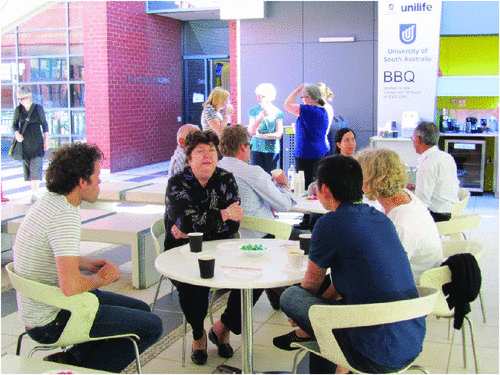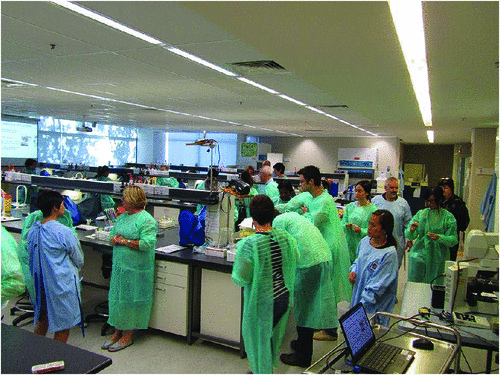ASM, Parasitology and Tropical Medicine SIG
Master Class 2013 Adelaide 1–2 March 2013
Andrew Butcher
National Convenor 2012–2013
ASM, Parasitology and Tropical Medicine SIG
Email: andrew.butcher@health.sa.gov.au
Microbiology Australia 34(2) 115-116 https://doi.org/10.1071/MA13019
Published: 13 May 2013
The ASM, Parasitology and Tropical Medicine Special Interest Group held the 4th Master Class in Adelaide on 1–2 March 2013. The Master Class coincided with the Adelaide Fringe, Arts Festival and Clipsal 500 V8 car race but more importantly with the visit to Australia of Lynne Garcia, who was in Melbourne to present at the RCPA Update 2013 program. Lynne’s visit to Australia was kindly sponsored by the RCPA. The Parasitology SIG would like to acknowledge the on-going support of the RCPA and ASM as we partner in the on-going education of technicians, scientists and medical trainees in diagnostic parasitology. We also acknowledge the generous support of Thermofisher, BioPharm, SA Pathology and University of SA who provided financial and facility support to host the Master Class.
Lynne Garcia was the keynote speaker for the Master Class. Lynne was the Manager of the UCLA Clinical Microbiology Laboratory before her retirement a few years ago. Now she is the Director of LSG & Associates, providing training, teaching, and consultation for Diagnostic Medical Parasitology and Health Care Administration. With over 400 presentations (international, national, and local), over 175 peer-reviewed manuscripts, book chapters, and books, including Diagnostic Medical Parasitology (5th edn, 2007) and Practical Guide to Diagnostic Parasitology (2nd edn, 2009), Lynne is considered to be one of the world-leading experts in diagnostic parasitology.
The Master Class program consisted of a full day of interactive seminars with a second day devoted to a hands-on wet workshop. During the seminar program Lynne presented a range of topics related to diagnostic parasitology. In the opening sessions she discussed the importance of correct test ordering, specimens collection and preservation along with the various test methods available to ensure the highest quality results. The development of a new non-formalin-based fixative (Total Fix) for the preservation of faecal specimens was presented. The fixative is suitable for a range of permanent stain faecal smear methods as well as commonly used rapid lateral flow EIA tests for Giardia and Cryptosporidium. Following the morning tea break, Lynne gave a comprehensive review of human intestinal protozoa and free living amoeba. After lunch Lynne reviewed malaria diagnosis highlighting the morphological characteristics of the various species and the common pitfalls in the misdiagnosis of malaria. To complete the picture she then reviewed other common blood parasites.

|
To complement Lynne’s presentations a number of young and emerging scientists with a special interest in parasitology were invited to present short case studies or papers on their research and development work. The first presenter was Tania Sadlon from SA Pathology who detailed her work on the development of an in-house multiplex PCR assay for the routine screening of faecal samples for Giardia, Cryptosporidium, Dientamoeba fragilis and Entamoeba histolytica. Tania presented the validation of the method and comparison with microscopy. The multiplex PCR significantly increased the detection rates of all parasites in the multiplex assay when compared with microscopy. This was highlight by a case study of locally acquired Entamoeba histolytica in two families. Tamalee Roberts from St Vincent’s hospital Sydney presented a case report on of microsporidial myositis involving a lung transplant recipient infected with Anncaliia (Brachiola) algerae. Tamalee summarised the diagnostic feature of microspordia and the opportunistic infections seen in immuno-compromised patients. She used the case of microsporidial myositis to demonstrate the importance of accurate diagnosis. Shirley Chong from Fremantle Hospital in Western Australia presented a case study of malaria in an African male returning to Australia after a visit to his homeland. The case report helped emphasize the importance of accurate diagnosis and patient history as discussed by Lynne Garcia during her session on malaria. To continue with the malaria theme Franca Azzato from Victorian Infectious Diseases Reference Laboratory presented the versatility of a PCR assay for malaria. Franca presented the development and use of a malaria PCR assay to eliminate any uncertainty in diagnosis. The assay has provided a rapid, sensitive and accurate confirmatory test to assist in the diagnosis of mixed infections; to determine the effectiveness of treatment; and to aid in the detection of any other discrepancies in diagnosis, especially in cases of low parasitaemia. The final case study in the seminar session was presented by Thuy Phan from Concord Hospital in Sydney. Thuy presented a case study of a family with unexplained eosinophilia with the only parasite detected was Dientamoeba fragilis. She detailed the family’s history and clinical presentation to discuss various aspects of the family’s life style which exposed them to the risk of parasitic infections.
The final session of the day 1 seminar series was presented by Harsha Sheorey a consultant Microbiologist from St Vincent’s Hospital in Melbourne. Harsha presented a scheme for the identification of common medically important arthropod. He discussed the classification of arthropods, important morphological features and the infestations caused by these organisms. The identification scheme provided by Harsha will greatly assist in the accurate classification of arthropods submitted to laboratories for identification.

|
The second day of the Master Class was a hands-on wet workshop held in the University of South Microbiology teaching laboratory. The first session of the morning involved the preparation of faecal smears and concentrations ready for staining and microscopic examinations. Two faecal egg concentration techniques were compared with participants counting egg recovery from each technique. After a relaxing morning tea on the plaza deck of the Uni SA laboratories it was back to the microscope to view a series of case study specimens. This included a range of specimens from protozoa, helminth and arthropod infections. Participants were provided with stained slides or wet mount material to view the target organisms. They were assisted and guided by expert faculty and the projection of microscope-camera live images of the target organisms to facilitate discussion about the case, parasite life cycle and diagnostic morphology.
Expert faculty consisted of Lynne Garcia on the microscope-camera to provide expert comments about the parasite morphology, life cycle, characteristics and diagnostic pitfalls. On the floor, assisting the participants at the bench and presenting discussion on each case were the “old heads” Harsha Sheorey, Norbert Ryan, Gary van Arkadie and Andrew Butcher who were excellently supported by the “young heads” Tamalee Roberts, Shirley Chong, Thuy Phan. It was fabulous to see the competency and enthusiasm of the next generation of parasitology scientists as they presented in the seminar and wet workshop series.
The Parasitology and Tropical Medicine SIG held the AGM at the end of day one. There were a number of new initiatives which have progressed including a Facebook page, shared space on a Google G-Drive to upload images for tele-diagnosis, SIG web presence hosted by the ASM and the establishment of a master class scholarship to support disadvantaged scientist attending future master classes. Participants were encouraged to be a member of ASM and the SIG to access these facilities. Also, ASM members with an interest in Parasitology and Tropical Medicine were encouraged to update their profiles to be an active member of the SIG to ensure they receive the latest news.
As we finish one master class the planning for the next starts. The intention is to hold the next master class in Perth in late 2014 or early 2015 with a focus on Tropical Medicine. Stay tuned for more information as the program develops over the next 12 months or so.


